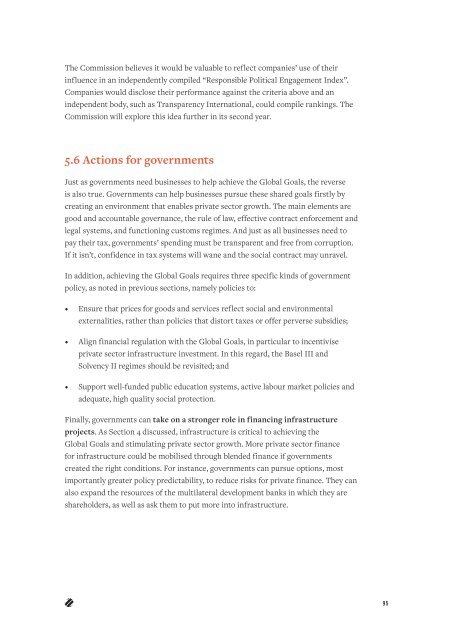BETTER BUSINESS BETTER WORLD
2jxE7K2
2jxE7K2
You also want an ePaper? Increase the reach of your titles
YUMPU automatically turns print PDFs into web optimized ePapers that Google loves.
The Commission believes it would be valuable to reflect companies’ use of their<br />
influence in an independently compiled “Responsible Political Engagement Index”.<br />
Companies would disclose their performance against the criteria above and an<br />
independent body, such as Transparency International, could compile rankings. The<br />
Commission will explore this idea further in its second year.<br />
5.6 Actions for governments<br />
Just as governments need businesses to help achieve the Global Goals, the reverse<br />
is also true. Governments can help businesses pursue these shared goals firstly by<br />
creating an environment that enables private sector growth. The main elements are<br />
good and accountable governance, the rule of law, effective contract enforcement and<br />
legal systems, and functioning customs regimes. And just as all businesses need to<br />
pay their tax, governments’ spending must be transparent and free from corruption.<br />
If it isn’t, confidence in tax systems will wane and the social contract may unravel.<br />
In addition, achieving the Global Goals requires three specific kinds of government<br />
policy, as noted in previous sections, namely policies to:<br />
• Ensure that prices for goods and services reflect social and environmental<br />
externalities, rather than policies that distort taxes or offer perverse subsidies;<br />
• Align financial regulation with the Global Goals, in particular to incentivise<br />
private sector infrastructure investment. In this regard, the Basel III and<br />
Solvency II regimes should be revisited; and<br />
• Support well-funded public education systems, active labour market policies and<br />
adequate, high quality social protection.<br />
Finally, governments can take on a stronger role in financing infrastructure<br />
projects. As Section 4 discussed, infrastructure is critical to achieving the<br />
Global Goals and stimulating private sector growth. More private sector finance<br />
for infrastructure could be mobilised through blended finance if governments<br />
created the right conditions. For instance, governments can pursue options, most<br />
importantly greater policy predictability, to reduce risks for private finance. They can<br />
also expand the resources of the multilateral development banks in which they are<br />
shareholders, as well as ask them to put more into infrastructure.<br />
95


